Argentina defaults again; currency restrictions hurting property market
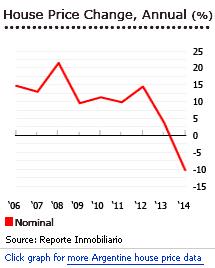 Argentina has been here before.
Argentina has been here before.
In 1989, Argentina experienced a period of hyperinflation, with annual inflation reaching almost 5,000%. Combined with power cuts, this led to the downfall of Raul Alfonsín’s presidency. A similar crisis in 2001 forced another president, Fernando de la Rua, to vacate his seat, leading to what is now considered the largest ever sovereign default, amounting to US$ 95 billion.
Now Cristina Fernández’s popularity is plunging and the economy is paying the price for her populist policies. Inflation is a big problem. The country’s economic outlook is bleak. The peso has been crashing.
In January 2014, Argentina devalued its currency by 19% as it struggled to hold onto dollar reserves.
On 31 July 2014 came Argentina’s debt default. This is a complicated matter – Argentina has the money, but vulture fund Elliott Management’s victory in a U.S. court has rendered technical default Argentina’s only way out of a painful situation, for now.
Uncertainty about the Argentine peso is jinxing the country’s property market. On one hand, sellers demand to be paid in dollars, proven safer than the peso. On the other, buyers are prevented from acquiring these dollars by strict currency controls.
In 2013, Argentina’s economy expanded by only 3%, after only 1.9% GDP growth in 2012. Looking further back, the Fernández government oversaw 8.9% GDP growth in 2011, 9.2% in 2010, and six years of excellent growth after 2012, before a blip during the global crisis of 2009.
That growth was at the cost of inflation, which remains stubbornly high. Foreign reserves are down to less than US$ 30 billion and are still dwindling despite tight currency controls encouraging dollars to return to the country, partial devaluation, and since the beginning of 2014 much higher interest rates and a new inflation index.
The country’s real estate industry, which is practically a dollar-only market, is suffering.
Sales and prices are down
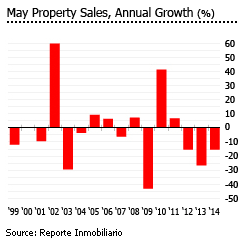
Prices in Buenos Aires were down 10.3% in May, compared with the previous May, to US$ 1,693 per sq.m.. Sales declined 15.4% y-o-y in May, to 2,898 transactions, according to Reporte Inmobiliario, having already declined significantly the previous year.
Mortgages are limited, with only 3% of Argentines having access to such facilities. Many are turning to rented accommodation as home ownership becomes harder, on the back of limited mortgage lending and stringent currency regulations.
“The main issue in Argentina is that the real estate market has historically been transacted in dollars so when you make it impossible for people to source dollars liquidity gets disrupted,” says Bret Rosen, managing director of research at Jamestown Properties LLC in New York.
Inflation is falling
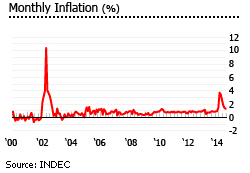
Credible private estimates put Argentina’s real inflation rate in 2013 at 55%, despite much lower official estimates. On February 13 a new nationwide CPI index replaced the benchmark greater Buenos Aires index, which had shown inflation at less than half private estimates since 2007. The move came a year after Argentina was the first nation censured by the International Monetary Fund for failing to report accurate economic data.
According to the new index, inflation is now falling. It was 1.8% in April, 2.6% in March, 3.4% in February and 3.7% in January. However that’s the officially estimated CPI increase per month, not per annum.
The authorities have managed to contain inflation by a new policy of keeping interest rates at almost 30% while negotiating price caps on hundreds of consumer staples and price rollbacks on industrial goods. Yet despite the new index, private estimates believe inflation is still somewhat higher than the official index, and the IMF is still grumbling that Argentina needs to clean up its statistics.
Mortgage lending hampered by Argentines’ distrust of banks
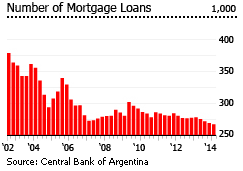
Almost all property deals are done for cash in Argentina, without a mortgage. The fact is, Argentines do not trust their banks. So savings from the private sector barely enter the banking system.
“If the people don’t put their money in the banks for saving, then the bank does not have any money to lend,” says Sebastian Sosa, owner of real estate company RE/MAX. He adds that unless stability, credibility and trust are established, mortgage finance in the country will remain limited.
Increasing external savings are no longer an option. Since the economic crisis of 2001, it’s been difficult for Argentina to attract foreign individuals and companies to deposit funds in the country’s banking system.
The current loan situation is very disappointing, with available mortgage credit falling by around 50% from 2000 to the present, according to the Central Bank of Argentina. The vast majority of real estate transactions will continue to take place in cash.
Argentines are turning to rented accommodation – yields are high
Renting is the only option for many who have no means of saving and buying property, owing to limited mortgage lending. This, along with the difficulty of acquiring dollars for real estate transactions, has brought a surge in demand for rented accommodation. But finding a place to rent in Argentina is becoming increasingly difficult.
Unsurprisingly, rents have been rising. During 2009, they fell significantly in terms of US dollars but now they are stronger again. Average apartment rental yields are around 7% to 8%, based on the latest Global Property Guide research.
Those who can afford to buy property tend to invest in buy-to-let properties because they perform remarkably well due to growing demand. Property owners who were once looking to sell are now content to rent out, as selling has become difficult.
Central Bank to regulate interest rates
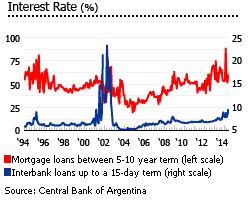
Interest rates were allowed to rise sharply at the beginning of 2014 as part of a shift in government policy to contain inflation and incentivize dollar inflows. However, while interest rates on short-term deposits currently stand at around 22%, annual interest charges on loans and credit cards are frequently above 50%, and in some cases reach above 100%, according to Argentina Independent.
Cabinet Chief Jorge Capitanich recently announced that the Central Bank would begin to regulate “extortionate” interest rates in the financial system.
“It is in the State´s interest to set a regulatory framework to prevent abuses that affect loan takers with a negative impact on consumption and on all Argentines,” said Capitanich. “Many countries regulate interest rates,” he explained, mentioning France, Italy, Germany, Colombia, Chile and Uruguay as examples.
It is expected that restrictions would be applied to interest rates on all types of credit. The new regulations will seek to reduce the gap between the interest rates offered by the Central Bank to the private sector, and those offered by commercial banks to consumers.
Construction activity continues to decline
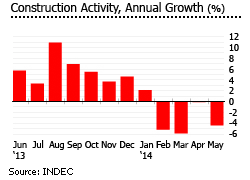
Seasonally-adjusted construction in Argentina fell 2.6% in the first quarter of 2014 compared with the same period in 2013, according to the National Institute of Statistics and Censuses (INDEC). In May 2014, construction level dropped 4.4% y-o-y (seasonally-adjusted). Weak construction activity is largely due to the weak wider economy.
Most construction inputs also displayed negative growth. Sales for construction paint fell 15.9% from January to May 2014 compared to the same period in 2013. Sales also fell for asphalt (-4.9%), cement (-3.3%), and hollow blocks (-3%). On the other hand, sales for floor and wall coverings increased 28.6%.
CEDIN: government’s laundering tool
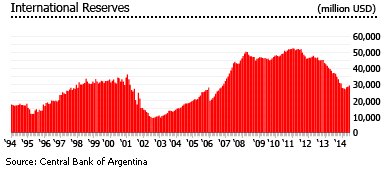
To reduce the size of the black market and find a new source of dollars, the government created the CEDIN (Certificado de Deposito Para Inversion), a Certificate of Deposit for Investment which began circulating in July 2013.
Locally known as the “laundering law”, the scheme invites those with undeclared dollars to trade their dollars for CEDINs (without facing penalties for their “black” currency – in effect, a tax amnesty). The dollars received must be spent on buying or renovating a house. The recipient (house seller or contractor) may then sell the certificate(s) or cash them in for real dollars at the Central Bank.
The government believes that Argentines have about US$ 160 billion worth of undeclared dollars. That is more than five times the value of Argentina’s foreign currency reserves. Alejandro Vanoli, head of the Security and Exchange Commission, at first asserted that the certificates will have a “revitalising” effect and “bring an interesting level of liquidity to the economy”.
Most people, however, were skeptical and thought that the CEDIN would have very little impact in reversing downward trends in the property market and construction industry. Many felt that opposition members of parliament would reject the whole deal when Fernández’s mandate ends. And if someone transfers the money into the country from an unreported bank account held abroad, he must report its history of transactions!
After nine months the Cedin had only managed to attract US$ 754 million – not nothing, but only 18.8% of the government’s initial goal.
A rough journey ahead
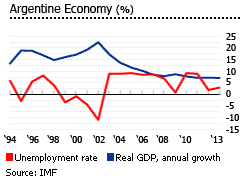
After the country lost its longstanding legal battle with US hedge fund creditors, it is now returning to courts again, this time against the United States.
Argentina has asked the international court of justice (ICJ) in The Hague to hear a lawsuit against the United States over an alleged breach of its sovereignty, after a US court judge blocked it from paying its restructured 2001 debts, leading to the default of July 2014, the 8th default in Argentina’s 200-year history.
Argentina’s last default is primarily rooted in its earlier monetary policy. In the 1990s, the government decided to peg the Argentine peso to the US dollar. But this meant that during economic shocks, Argentina can’t use its usual monetary tools to control the economy.
When Europe’s and Brazil’s currencies fell so much in 1998, Argentina’s exports became severely expensive and Argentina desperately needed a weaker peso. This, of course, couldn’t be achieved without abandoning the dollar peg. It was then forced to reduce wages to cut prices. But this only pushed unemployment up and tax receipts down.
The government turned to fiscal policy – raising taxes and cutting spending to reassure investors about the deficit. But this made the slump even worse.
By late 2001, unemployment was over 20% and Argentines were rushing away from the peso. The government tried to stop the run by limiting withdrawals. But this only started violent protests which later caused the resignation of then president Fernando de la Rua. This led to a US$ 95 billion default, cutting off Argentina from international capital markets and hampering growth.
Argentina tried to make up on its obligations. In 2005 and 2010, it offered the holders of its defaulted debt new “exchange bonds” that paid 35 cents per dollar on the original debt. About 75% of outstanding bonds were exchanged in 2005. Then in 2010, there was a new offer to the remaining holdouts that brought participation to 93%.
The remaining 7%, led by Wall Street billionaire Paul Singer, refused to settle and sued Argentina in the US courts for full repayment. After a stretched court battle, the group got District Court Judge Thomas Griesa to rule that Argentina could not pay the creditors who had accepted its debt restructuring until it fully paid those who had rejected it. Unable to meet the creditors’ demand, Argentina was forced to enter its second default since 2001.
Economists expect an outflow of dollars if Argentina does not come out of this quickly, putting more pressure on dwindling central bank reserves, now less than US$ 30 billion.
However, no one expects a recession anywhere near as deep as in 2002, when GDP fell 10.89%.
Some even see the present situation as a buying opportunity.
According to Timetric, there has been an influx of international house buyers buying at 60% of the original value, due to high inflation, lack of local demand and discount for dollar purchases. This tangible investment can then be sold at a later date when the economy shows signs of stability.
Presidential elections may also encourage such investments. Since Cristina Fernández can no longer run for reelection in October 2015, there are hopes of more moderate economic policies from her successor.